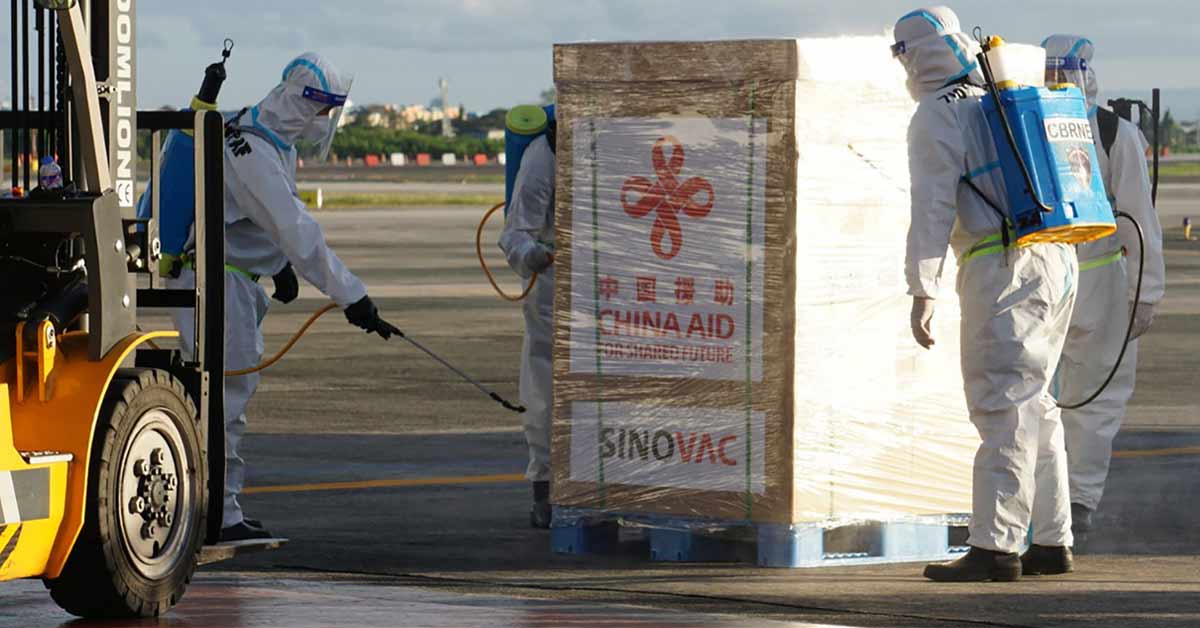China and the Philippines are close neighbours across the sea, sharing time-honoured bonds of friendship and kinship. Philippines-China bilateral relations have not only improved under President Rodrigo Duterte's administration but have been upgraded to "comprehensive strategic cooperation."
Indeed, the ties between the two countries have improved dramatically despite differences, as exemplified by the eight times face-to-face meetings between President Duterte and President Xi Jinping, which boosted a deepening friendship and mutual understanding between the two countries.
Despite the COVID-19 pandemic, the two leaders are often in touch with each other through "cloud diplomacy" via phone calls and the exchanging of letters and messages. Both leaders attach great importance to the two countries' bilateral relations, the Philippines and China. Undoubtedly, Philippines-China relations have gained some new vitality under the Duterte administration.
As a tribute and commemoration to the deepening friendship and shoulder-to-shoulder cooperation between the two countries in tackling challenges and pursuing joint development, the 5th Manila Forum for Philippines-China Relations with the theme, Hand in Hand for a Stronger and Reinforced Philippines-China Friendship, was held on 17 January, 2022. The forum was co-organised by the Association for Philippines-China Understanding (APCU) and the Embassy of the People's Republic of China in the Republic of the Philippines.
At the forum, H.E. Wang Yi, State Councillor and Foreign Minister of China, delivered a keynote speech and expounded on China's foreign policy and commitment to fostering a closer Philippines-China partnership in the new era.
H.E. Fu Ying, Vice-Chairperson of the Foreign Affairs Committee of China's 13th National People's Congress, China's former Vice Foreign Minister and Ambassador to the Philippines, also shared her insights and personal experience on Philippines-China relations.
Former President H.E. Gloria Macapagal Arroyo delivered a welcome remark, and H.E. Huang Xilian, Chinese Ambassador to the Philippines, rendered the closing remarks.
5th Manila Forum
During the forum, Wang Yi highlighted the strong bonds of partnership and friendship of the two countries through thick and thin. He also mentioned the historical ties between the two countries that span over a millennium. According to him, China brings not colonisation or war to the Philippines, but cooperation and friendship.
He said, "the story about the King of Sulu's (Paduka Pahala) visit to China was a historical epitome of our friendship."
The State Councillor and Foreign Minister of China likewise conveyed that China will continue to pursue a policy that will foster an amicable, secure, and prosperous neighbourhood and stay committed to the principle of amity, sincerity, mutual benefit, and inclusiveness in its neighbourhood diplomacy. Wang further added that China would promote greater solidarity and cooperation and join hands with the Philippines to fight the COVID-19 pandemic.
Wang also emphasised that China will join hands with the Philippines to speed up development and rejuvenation through the "Build, Build, Build (BBB)" program of the Duterte administration in synergy with the Built and Road Initiative (BRI).
The Chinese Foreign Minister also vowed that China being the largest trading partner and export market of the Philippines, will keep its doors open to more Philippines agriculture products and make more investment in the country, with a view of contributing to the country's efforts in accelerating industrialisation and modernisation and capacity-building for self-generated development.
On the sensitive issue of the disputed South China Sea (SCS), Wang reassured Filipinos that China would join hands with the Philippines to handle the SCS issue properly.
"We each have respective claims and positions. Before an agreement can be reached, it is important that we put the issue in a proper place and prevent it from affecting or even taking hostage the overall bilateral relationship. Stressing only one side's claims and imposing one's own will on the other is not a proper way for neighbours to treat each other, and it also goes against the Oriental philosophy of how people should get along with each other.
China will absolutely not use its strength to bully smaller countries, and we never believe in a winner-takes-all approach. We hope to work with the Philippines to find ways to properly manage and resolve the issue in the spirit of goodwill and pragmatism. We need to come up with the resolve as soon as possible to advance joint development without prejudice to either side's rights and claims so that we can turn the South China Sea issue from a challenge into an opportunity and a positive factor conducive to the development of the Philippines and the friendship between our two peoples," he said.
Foreign Minister Wang also declared that China would join hands with the Philippines to maintain peace and stability in the region. He expressed that East Asia is a shared home for the Philippines and China, and it is a region with the most significant development potential in the world. However, he also expressed that some forces outside the region are trying to frustrate this good momentum with repeated provocations.
"As two important members of the region, China and the Philippines should stay committed to an independent foreign policy, uphold the ASEAN-centred regional cooperation architecture, deepen the China-ASEAN comprehensive strategic partnership, and contribute to the stability and prosperity of the region," Wang added.
Tangible Gains
Almost six years under the Duterte administration, Philippines-China relations have blossomed and gained newfound vigour far from the previous administration's antagonistic and tension-driven state of affairs.
Likewise, Filipinos have appreciated and recognised the importance of having friendly relations with China. They have come to appreciate the tangible benefits and gains that this friendship brings to the country.
For instance, during the aftermath of typhoon Odette, among the country's international partners, China responded first and extended relief efforts and help to the victims of typhoon Odette as a show of solidarity with the Philippines.
China provided relief goods, rice sacks, drinking water, and financial aid. As an urgent response, the Chinese Embassy raised 20,000 food packages worth around PHP 8 million (US$156,000) as early as 22 December, 2021. With the help of the local Filipino-Chinese Community, the relief goods were delivered to the victims of typhoon Odette in affected areas like Cebu, Leyte, Negros Occidental, Bohol, Cagayan de Oro City, Surigao City, Negros Oriental, and others.
The Filipino Chinese Community Calamity Fund (FCCCF), led by 11 major Filipino Chinese business, civic and cultural organisations, raised 75 million pesos (US$1.46 million) for relief operations to assist typhoon victims in Visayas and Mindanao.
Aside from the 10,000 tons of Chinese government-donated rice entrusted to the Department of Social Welfare and Development (DSWD) and the 100,000 bottles of drinking water turned over to the Office of Civil Defense that benefitted many typhoon victims in affected areas, the Chinese government also provided US$1 million (about PHP 50 million) in emergency cash assistance to the Philippines.
Wang Yi announced during the 5th Manila Forum an additional grant amounting to RMB 100 million (about PHP 800 million) from the Chinese government to the Philippines to support the Philippines's reconstruction efforts in areas affected by typhoon Odette.
The banana trade between the Philippines and China offers enormous benefits to local farmers. In trade and commerce, US$540 million worth of Philippine bananas were exported to China in the first nine months of 2021. It accounted for 34.2 percent of the Philippines' total banana export value and registered a year-on-year growth rate of 47.4 percent.
In terms of quantity, 1.24 million metric tons of locally produced bananas, or 36.8 percent of the country's total banana exports, were delivered to China in the same period, increasing by 38 percent. These figures only confirm that the Philippines is China's number one supplier of bananas at the moment.
China donated RMB 130 million (about PHP 1 billion) worth of military assistance to the Philippines, which included rescue and relief equipment, drone systems, detectors, water purification vehicles, ambulances, fire trucks, x-ray machines, EOD robots, bomb disposal suits and transport vehicle, engineering equipment-backhoes, dump trucks, forklifts, and earthmovers.
In terms of infrastructure and transport development, it was announced that the Philippine National Railways (PNR) Bicol project worth PHP 142 billion (US$2.7 billion) through the official development assistance (ODA) loan from China would begin construction in the first quarter of the year. Likewise, Chinese companies in the Philippines have created 55,000 local jobs and at least 8,000 new jobs during the pandemic.
Good Riddance
Despite challenges and differences between the two sides over the contested waters of the SCS, bilateral relations between the Philippines and China are gaining ground.
According to H.E. Vice-Chairman Fu Ying, the relationship between the Philippines and China is not without difficulties, and the most difficult is the disputes in the SCS. It is sensitive and complicated, and there is no easy solution.
However, Fu made a condition that whenever the two sides can properly handle and manage the differences, the two countries' cooperation would proceed without disruption. Still, the overall bilateral relations would suffer when disputes are allowed to escalate or even get out of control.
Fu also offered some practical steps both countries should employ to handle the sensitive issue concerning the SCS appropriately. She said, first, respect and abide by the consensus reached by the leaders of our two countries, President Rodrigo Duterte and President Xi Jinping.
Both leaders have discussed the issues concerning the disputes on several occasions. They went into great depth, reached a profound understanding, and agreed that the differences should not interrupt the normal progress of bilateral relations. They should be put in an appropriate place and properly handled through dialogues. The two sides should follow this consensus in good faith.
Second, maintain active communication. To enhance mutual understanding and build trust, the two sides may fully leverage the dialogue mechanisms created over the years, including the China-Philippines Foreign Ministry Consultations and the Bilateral Consultation Mechanism on the SCS.
Third, stay firmly on the positive side of the relationship.
Hence, Fu basically purported that the disputes should not become a defining issue for the two countries’ relations.
"I trust that people in both countries want to see the relationship bear rich fruits and hope many of you who have contributed to our cooperation will continue to make dedicated efforts to help develop, safeguard and advocate China-Philippines friendship. With our joint efforts, our friendship will stand tall and brave the wind and rain," Fu said.
Conclusion
Hence, for the benefit of the two countries, the Philippines and China must continue to deepen their mutual understanding, trust, and friendship while resolving whatever differences such a relationship has, may it be over the disputed waters of the SCS or in other areas in a peaceful, calm, farsighted and diplomatic manner for the sake of peace and prosperity.
The views expressed in this article are the author’s own and do not necessarily reflect those of The ASEAN Post.

